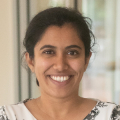You have no items in your cart. Want to get some nice things?
Go shopping
I am six. It’s my first day at a new school in a new country. I didn’t really get a summer break, since school in India begins just after school in the US ends. I’m being ferried with my peers on a rickety van that is very different from the yellow school bus I’m used to. Once identified as a new kid, I am interrogated.
“What’s your name?”
“Which class are you in?”
“Who’s your teacher?”
“What’s your mother tongue?” I am thrown by the last one. Mother tongue? Someone notes my confusion.
“What language do you speak at home?”
“English?” I venture. Blank stares. I’ve somehow answered the question wrong, but English is the only language I speak. The alien phrase sticks with me throughout the day, and when I get home I ask my mother what our mother tongue is. Apparently, it’s Tulu. I hadn’t heard that answer when I’d asked my peers what their mother tongues were. But now I know how to answer that particular question. Though it’s not quite the truth, since all we speak at home is English.
*
I am still six. My mother has been teaching me the Hindi alphabet at home so I can catch up with my classmates. I hate it. There are too many letters and I just can’t add the matras to all the different consonants correctly. But I can read a little now.
Our Hindi teacher is nice and doesn’t hold it against me that I’m still learning how to read. We’re working on three-letter words. Our teacher writes a word on the board and asks who can read it. Hands fly up across the room. Today’s a review day and we’ve seen all these words before. Then she writes a new word on the board.
“Who can read this?”
We’re all stumped. I don’t know to avoid eye contact as she looks around the room.
“Tarini?”
I stand. The new word is a three-letter word, so it can’t be that hard. The first letter looks like a stick being spoon-fed, that’s ch, the last letter is luh, but the middle letter is throwing me off, it looks like a puh but it’s got an extra bit on the front.
“Chap-pal?” I stutter. And as soon as I say the word, it clicks. Chappal! Flip-flops! My teacher smiles as I sit down. I’m buzzing for the rest of the day.
*
I am ten. I’m in fourth standard and I’m a good student for the most part. Hindi is my weak point but doesn’t everyone have one? It stopped being interesting in first standard as we cycled through Hindi teachers, learning three-letter words, four-letter words, five-letters words, three-letter words, four-letter words, five-letter words and then it got difficult and I stopped trying. I was doing fine at everything else, especially English.
Our Hindi teacher this year is fascinating and terrifying. I remember hearing her yell from the floor above when I was in third standard. The boys’ class is her primary domain but she teaches Hindi to all three girls’ sections as well. Everyone seems to like her somehow. I don’t know what I’m doing in Hindi but I laugh along with everyone else when she cracks jokes about our reading for that day.
We have spelling tests every week. Our teacher does this thing where we swap tests with the person next to us and grade their test, and then we bring it up to the teacher’s desk to be checked. Our teacher also does this thing where if you make a mistake grading someone’s test, she hits you hard on the leg. Very hard. It gets quiet when the first person to make a mistake gets found out. It stays quiet till our teacher leaves at the end of the period.
I approach the big desk at the front of the room and set my partner’s test down. I watch our teacher’s face and to my horror she whips her head around and screams.
“LOOK AT THIS! Bada ee instead of chhota ee!”
I’ve mixed up my matras. I hear a whack and the side of my leg burns. I burst into tears.
“Stop crying!”
Another whack and the pain in my leg flares.
“Go and fix it!”
I stumble to my desk. I can see my friends looking at me pityingly. As I slide into my chair three rows from the front I hear our teacher say, “And right in front of the board too! Useless!” My partner is apologizing but I shake my head.
*
I am eleven. In fifth standard, Hindi gets divided into literature and grammar. I care for neither. Kannada class was alright last year but our current Kannada teacher is awful. She drones and doesn’t take questions and looking down at today’s test I realize I haven’t learned anything. The interesting thing is I don’t care. I’m fine at everything else.
I write down what I can and take my test to be graded. The teacher looks at it for a second and slides it back to me with contempt.
“Zero,” she says, loud enough for everyone to hear. I hear a gasp. But I really don’t care, so much that it’s hard to not laugh as I walk back to my desk.
*
I am thirteen. We’re going to see extended family that live near my maternal grandmother. I’m wearing a salwar-kameez that’s been starched half to death so it can stand in the summer humidity. We pull into the driveway of a large traditional coastal house, yellow-walled and roofed with red clay tiles. I can’t remember who lives here.
We’re now in the living room, sipping tea out of steel tumblers. I start to daydream as the conversation happens around me, thinking about which old Reader’s Digest issue I’ll dive into when we get back. My mother nudges me. I come to and hear a familiar question.
“Tulu barpunda?” (Do you know Tulu?) My response is practised by now. I look down at the floor and shake my head. I feel less and less ashamed the more I hear that question. My mother doesn’t though, and I know a post-visit lecture is coming as our hosts click their tongues disapprovingly. My grandmother takes part in the lectures now too. It’s no longer cute that the little American kid can’t speak her mother tongue.
*
I am seventeen. Everyone in twelfth standard has to do a week-long internship somewhere they’d like to work in the future, and I was urged to try my hand at journalism over physics because my English is good. The newspaper office is in the middle of the city, and my parents thought it would be good for me to take the bus there. So here I am, standing at the bus stop as assorted traffic flies past. I vaguely register the babble of Kannada around me as I look down the road for my bus.
The G9 comes roaring towards us and brakes suddenly. I join the women streaming towards the front door and find a space to wedge myself in as the bus rumbles off. The conductor comes around to collect fares.
“Yeshtu?”(How much?), I ask when he gets to me, hoping my pronunciation was alright.
“Eylu.” I count quickly in my head – aidhu, aaru, eylu – seven rupees, alright. I don’t have change today so I hand him a ten rupee note. He stuffs it into his bag and moves on to the next person. I open my mouth to say something, then close it.
*
I am eighteen. I’m back in the US for the first time in twelve years, to start college. I’m still reeling from being in a place where I can get by on English alone. I’ve met so many new people and the mother tongue question hasn’t come up once. Now the only defining thing about me is that I’m a physics major. I walked right past the South Asian Students table at the activities fair to sign up for the local Society of Physics Students chapter. I love this feeling of starting fresh.
In the second lecture of Classical Mechanics, I boldly raise my hand to ask a question about an equation on the board. Fresh start, right? No more sitting quietly when I don’t understand things. “What’s a Taylor expansion?” The professor looks surprised. It turns out most of my peers are in Calculus II or more advanced math classes. I’m in Calculus I, that’s what my academic advisor recommended for international students. My stomach turns a little. I don’t feel so excited anymore.
*
I am twenty. I’m visiting home for the second time since starting college. My aunt has come to visit with her daughter. While my aunt and my mother chat in the kitchen, I entertain my cousin with my old dinosaur toys. She knows a lot about dinosaurs, it turns out, naming each one correctly as I hold it up.
My aunt walks into the room. “Chinnu, inchi balle, time to go.” (come here) My cousin’s protest is dismissed by a flood of admonishments in Tulu. After they leave, I help my mother with cleaning up. A question occurs to me.
“How come you didn’t talk to me in Tulu when I was younger?”
“I did, until you started preschool. Then your teachers told me to stop, since you weren’t picking up English fast enough. So I did.” She pauses. “My biggest mistake with you.”
I sit with this new knowledge. She seems more upset with herself than with me. I cast around for something to say.
“But I turned out okay.” I’m not sure if I believe it myself though.
*
I am twenty-four. It is dark outside, and I am about to call home. My mother must’ve already started preparing lunch because it takes her a few rings to pick up.
“Hello?”
“It’s me.”
“How was your week?”
I fill her in about my research and how the galaxy I’m studying is being difficult, and she tells me about the drama in the residents welfare association and the latest family news. Then I hear her get distracted by something, and I know she has to go. I start to say bye.
“Taru, before you hang up, say hi to Ajjamma first.”
I hear a fumbling and my maternal grandmother comes on the line.
“Hageedee putti?” (How are you, little one?)
I smile, because I know she can tell, and dampen the Americanness of my accent the best I can.
“I’m fine, Ajjamma, hageedee?”
A familiar shame sidles into the room as I grasp at my meagre store of Kannada and Tulu. My grandmother and I muddle our way through a multilingual conversation that’s happened many times before – how’s your leg? Feeling better, pain’s still there, how is the weather? Warm today but it was cold yesterday, Texas is like that, how’s the weather there? Okay, putti, getting hotter. Oh, okay. A short pause. Anyway, study hard, look after your health, putti. You too, Ajjamma.
I hang up. The shame’s still sitting there. I distract myself with my phone, swiping mindlessly, when I come across the Kannada learning app I downloaded a month ago. I look at it, then I notice it’s past eleven. I have to get ready for work tomorrow.

About Tarini Konchady
Tarini Konchady is a graduate student studying astronomy. She is a member of the Astrobites collaboration, which publishes daily summaries of research papers and articles on the larger astronomy community. She started as the second Media Fellow at the American Astronomical Society (AAS) in the latter half of 2019, where she works with the AAS Press Officer and the editor of AAS Nova.
- Web |
- More Posts(1)



